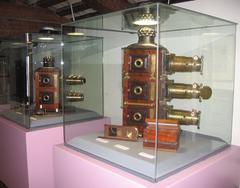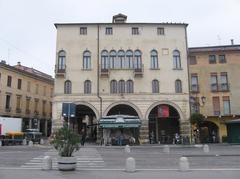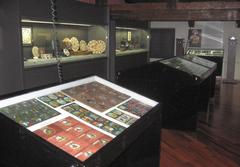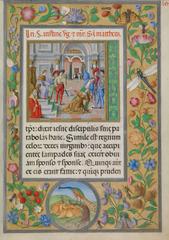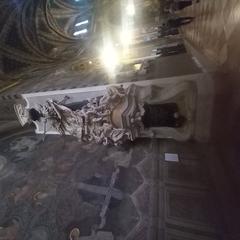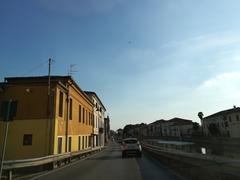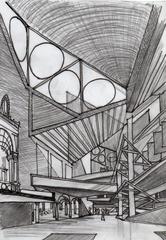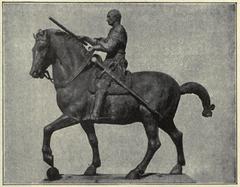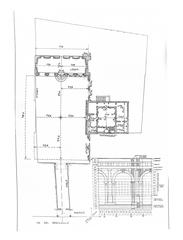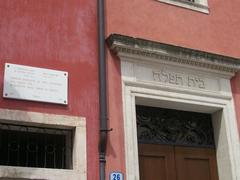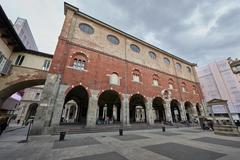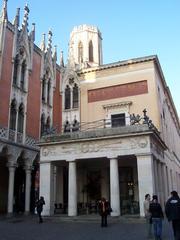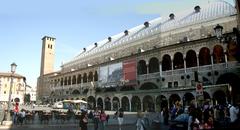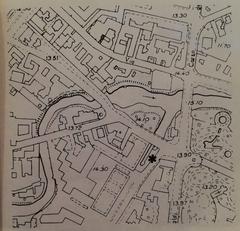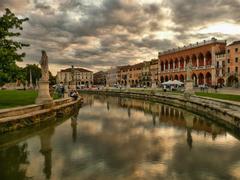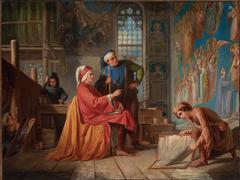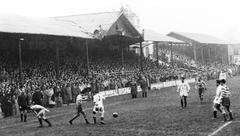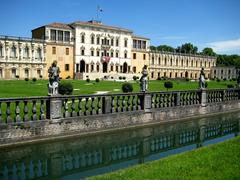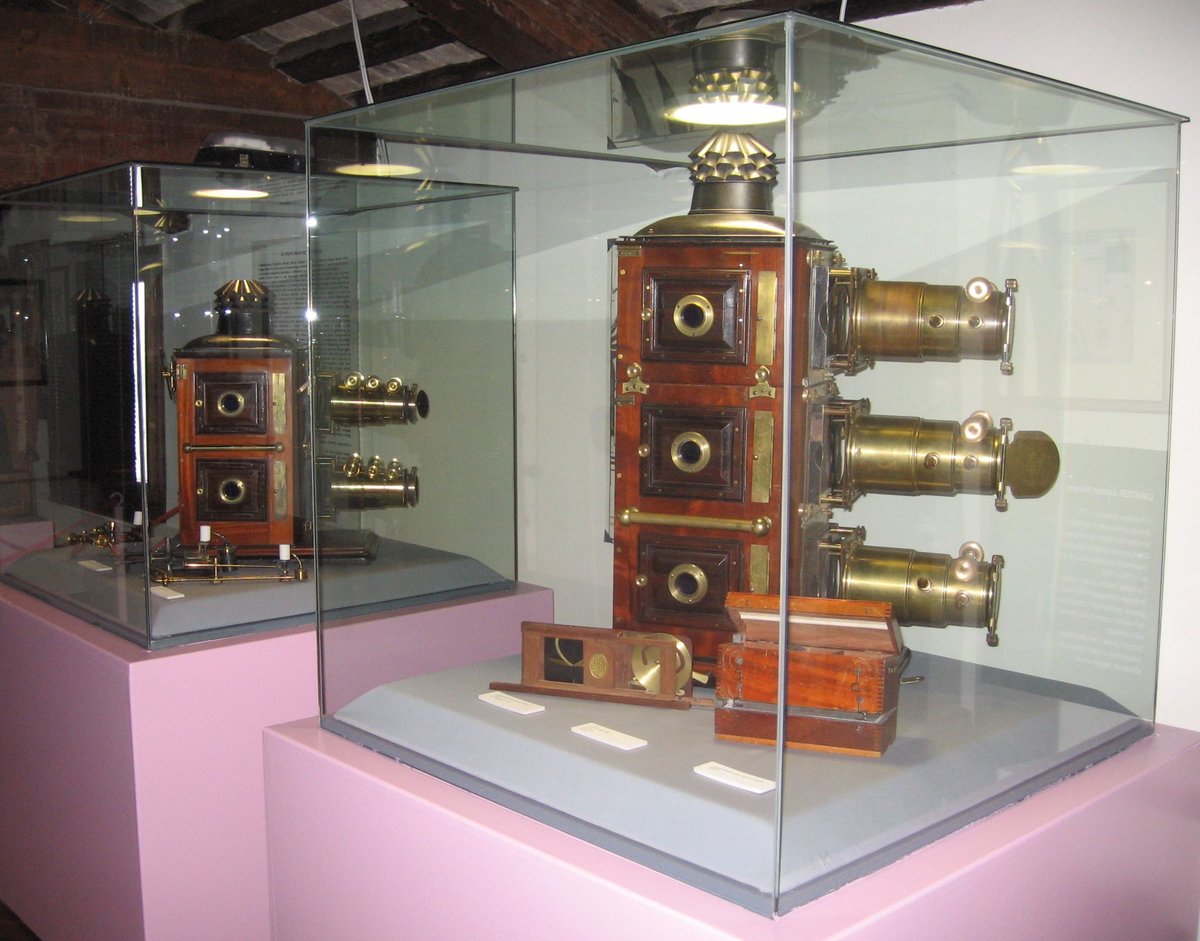
Museum of Precinema Padua: Visiting Hours, Tickets, and Historical Sites Guide
Date: 15/06/2025
Introduction
Nestled within the historic Palazzo Angeli in Padua, Italy, the Museum of Precinema (Museo del Precinema) is a singular destination for those fascinated by the origins of visual storytelling. The museum provides a comprehensive journey through the evolution of optical entertainment, from the early days of magic lanterns to the precursors of modern cinema. Established in 1998 and founded on the remarkable private collection of Laura Minici Zotti, the museum showcases an impressive array of rare artifacts—including hand-painted glass slides, optical toys, and mechanical animation devices—dating from the 17th to the 19th centuries. Its immersive exhibits and educational outreach make it a vital cultural hub within Padua, offering invaluable insight for history enthusiasts, cinema lovers, educators, and curious travelers alike (Museo del Precinema Official Site, Padua Tourism, Museum of Precinema – Visit the Museum).
This guide provides all the essential information you need to plan your visit, including practical details on visiting hours, tickets, accessibility, educational offerings, and tips for enjoying nearby Padua attractions.
Table of Contents
- Introduction
- Historical Background and Significance
- Practical Visitor Information
- Cultural and Scientific Significance
- Notable Artifacts and Exhibition Highlights
- Visitor Experience and Educational Outreach
- Research, Preservation, and International Collaboration
- Visuals, Media, and Digital Resources
- Frequently Asked Questions (FAQs)
- Conclusion and Planning Your Visit
- References
Historical Background and Significance
Origins of the Museum
The Museum of Precinema is housed in the Palazzo Angeli, a late 15th-century building overlooking Padua’s iconic Prato della Valle. The museum was established in 1998, arising from the Minici Zotti Collection, which was meticulously assembled by Laura Minici Zotti—an authority in the field of optical entertainment and cinema archaeology. Palazzo Angeli itself is steeped in history, having been home to the Angeli family and the astronomer Andrea Memmo, making it an apt setting for a museum that bridges art, science, and popular culture (Museo del Precinema Official Site, Padua Tourism).
The Evolution of Precinema
“Precinema” encompasses the tools, devices, and techniques that predate the invention of cinema, culminating in the Lumière brothers’ first films in 1895. The museum’s collection spans from the 17th to the 19th century and illustrates the evolution of visual communication and storytelling.
Magic Lanterns and Optical Devices
A highlight of the collection is over 300 magic lanterns—early projectors that used painted glass slides and various light sources to cast vibrant images onto walls or screens. These lanterns served educational, entertainment, and even religious purposes (Encyclopedia Britannica).
Other notable devices include:
- Phantasmagoria lanterns for ghostly illusions
- Mechanical slides with moving parts to simulate animation
- Dissolving view lanterns for smooth image transitions
Optical toys such as the zoetrope, phenakistoscope, praxinoscope, and stereoscope demonstrate early attempts to create the illusion of motion and depth (Museo del Precinema Collection, Magic Lantern Society).
Panoramas and Animated Slides
Hand-painted slides depict everything from fairy tales to scientific phenomena, often featuring mechanical elements for animation. Panoramic slides, sometimes over a meter long, were slowly moved through lanterns to create the effect of a moving landscape—an early form of cinematic storytelling (Magic Lantern Society).
Practical Visitor Information
Visiting Hours
- Standard Schedule: Tuesday to Sunday, 10:00 AM – 6:00 PM (last entrance at 5:30 PM)
- Closed: Mondays and certain public holidays (including January 1, Easter, April 25, May 1, December 24–26, December 31)
- Special Summer Opening: In August, the museum extends its hours to 2:00 AM; however, it is closed from August 1–31 for annual maintenance. Always check the official website for the most current information (Museum of Precinema – Visit the Museum, WhichMuseum).
Tickets and Admission
- Adults: €6.00–€7.00
- Reduced: €4.00–€5.00 (students, under 18, over 65, Padova Card holders, FAI, Touring Club, tourist guides, EU citizens aged 18–25)
- Free: Children under 6, ICOM/MIBACT members, journalists, disabled visitors (plus one assistant)
Guided Tours:
- Small group (5–10 people): €10 per person (€8 reduced)
- Large group (11–25 people): €8 per person (€6 reduced)
- All group visits require advance booking
Tickets are available onsite and through the museum’s official website (Museum of Precinema – Visit the Museum).
Accessibility and Amenities
The museum is located on the top floor of Palazzo Angeli. Elevator access is available, but the historic structure may pose some challenges for visitors with mobility issues. Contact the museum in advance to ensure assistance. Informational materials and guided tours are available in English and Italian (Museum of Precinema – Visit the Museum).
Directions and Nearby Attractions
- Address: Prato della Valle 1/A, Padua
- Public Transport: Easily accessible by bus and on foot from Padua’s city center
- Parking: Limited parking near Prato della Valle; use public transportation or city parking lots when possible
Nearby attractions include the Basilica of Saint Anthony, the Scrovegni Chapel, the University of Padua, and the Botanical Garden (Veneto Inside).
Guided Tours and Events
Multilingual guided tours are available for individuals, families, and school groups. The museum also hosts special events and temporary exhibitions—check the Events Calendar for updates.
Cultural and Scientific Significance
The Museum of Precinema is a vital link between the art, science, and popular culture of the past and the visual media of today. Its artifacts reveal how early technologies fostered public education, entertainment, and scientific advancement. Magic lantern lectures, for instance, were popular among scientists and educators in the 19th century, illustrating the deep roots of visual communication (Science Museum Group).
Notable Artifacts and Exhibition Highlights
- Magic Lanterns: Over 300, from 17th-century wooden models to 19th-century mechanical lanterns
- Hand-Painted Slides: Depicting stories, science, and world travel
- Mechanical Slides and Animation Devices: Including cromatropes and phenakistoscopes
- Shadow Theaters: Complete with puppets and miniature stages
- Early Stereoscopic Devices: Precursors to 3D cinema
- Peep Shows and Dioramas: Rare immersive storytelling devices
- Ephemera: Posters, programs, and manuals that contextualize the collection
Visitor Experience and Educational Outreach
Arrival and Entry
Enter via the main door at Palazzo Angeli, ring the doorbell, and ascend to the third floor. Shadowy silhouettes along the stairwell set a thematic tone for your visit. The elevator is available for those who need it.
Hands-On and Interactive Exhibits
Unlike many museums, the Museum of Precinema encourages hands-on exploration. Visitors can operate select devices, experiencing firsthand the mechanisms behind early visual effects (Museum of Precinema – Visit the Museum).
Educational Resources and School Engagement
The museum collaborates with teachers to tailor visits for school groups, providing resources like “The Visual Language Exercise Book” for ongoing classroom engagement. Due to space constraints, workshops are unavailable onsite, but guided tours are adapted for all age groups (Museum of Precinema – Visit the Museum).
Visitor Services and Tips
- Group reservations: Mandatory for all group visits; book via [email protected] or +39 049 8763838
- Facilities: Modest, as expected in a historic building
- Photography: Permitted without flash, except where otherwise indicated
Research, Preservation, and International Collaboration
The museum maintains strict conservation protocols, including climate control and restoration by skilled conservators, to preserve its rare artifacts. It also lends items to international institutions (e.g., Cinémathèque Française, Museum of Cinema Turin) and partners with academic bodies for exhibitions and research. Its specialized library and publications support scholarly work in cinema archaeology (Museum of Precinema – Visit the Museum).
Visuals, Media, and Digital Resources
Explore the museum’s online gallery, virtual tours, and educational videos for a preview of the collection and to plan your itinerary. The Audiala app offers audio guides and additional content for visitors (Museum of Precinema – Visit the Museum).
Frequently Asked Questions (FAQs)
What are the Museum of Precinema’s opening hours?
Tuesday to Sunday, 10:00 AM–6:00 PM (last entry 5:30 PM). Closed Mondays and select holidays. Extended hours in August.
How much do tickets cost?
Adults €6–€7, reduced €4–€5, free for children under 6 and certain categories.
Is the museum accessible for visitors with reduced mobility?
Yes, with elevator access. Contact in advance for assistance.
Are guided tours offered in English?
Yes, upon request.
Can I take photos inside the museum?
Non-flash photography is permitted except for sensitive artifacts.
How do I book group visits?
Reserve by email or phone in advance.
Conclusion and Planning Your Visit
The Museum of Precinema stands as a unique cultural and educational landmark in Padua. Its immersive, interactive exhibits, expert guided tours, and commitment to preservation make it a must-visit for anyone interested in the evolution of visual storytelling. Plan your visit by checking current hours, booking tickets or tours in advance, and exploring digital resources to enhance your experience.
Combine your museum trip with visits to other Padua historical sites—such as the Basilica of Saint Anthony, Scrovegni Chapel, and University of Padua—for a rich, multifaceted cultural itinerary. Download the Audiala app for audio guides and stay connected via the museum’s website and social media for updates on special events and exhibitions.
References
- Museo del Precinema Official Site
- Padua Tourism
- Encyclopedia Britannica
- Magic Lantern Society
- Veneto Inside
- Science Museum Group
- WhichMuseum
- Museum of Precinema – Visit the Museum
